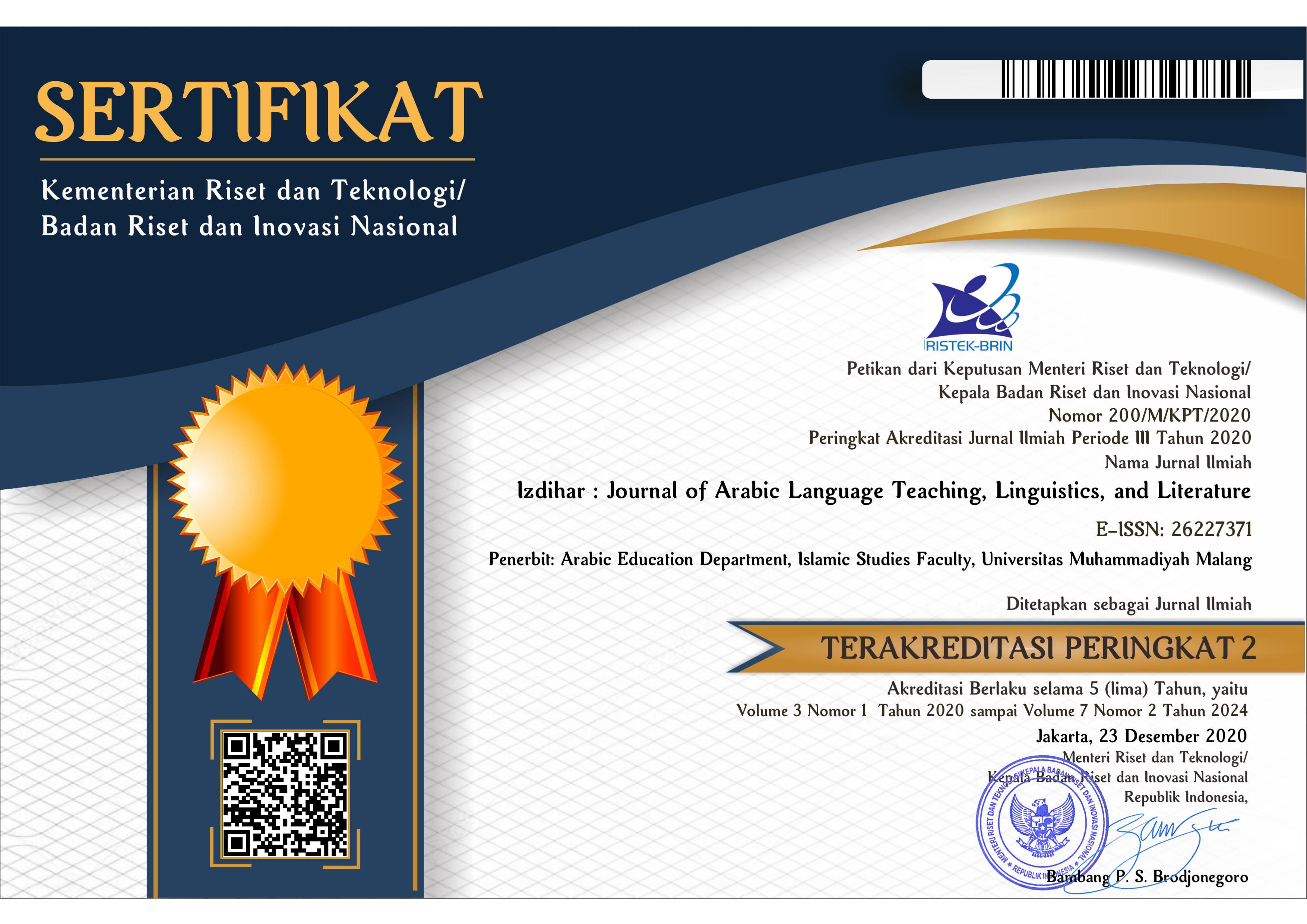The Implementation of Multicultural Values in Arabic Learning
DOI:
https://doi.org/10.22219/jiz.v5i3.21914Keywords:
Arabic Learning, Madrasah, Multicultural ValuesAbstract
The purpose of this study is to describe and analyze multicultural values in Arabic language learning in Madrasah (school) and what are the obstacles for educators in undergoing multiculturalism. The method used in this research is qualitative, with a field research study done in a detailed, intensive, and profound way on the object under investigation. The data analysis technique used is content analysis and descriptive analysis. The results of this study explain that the implementation of multicultural values in Arabic lessons in Madrasah has the values of democracy, humanism, and tolerance so that students can learn Arabic among their friends without the need to look at ethnicity, race, or culture. The challenges and obstacles in carrying out multiculturalism are the adaptation of students to the introduction of the learning environment, the understanding of which has not led to the value of diversity. With multicultural values, tolerance and mutual respect create a conducive and fun learning atmosphere so that learning Arabic does not become a realm of fear for students.
Downloads
References
Abdiyah, L. (2021). Filsafat pendidikan islam: Pendidikan multikultural. Tarbawy : Jurnal Pendidikan Islam, 8(2), 24–31. https://doi.org/10.32923/tarbawy.v8i2.1827
Abidin, A. M. (2021). Pendidikan moral dan relevansinya dengan pendidikan Islam. Jurnal Paris Langkis, 2(1), 57–67. https://doi.org/10.37304/paris.v2i1.3282
Akhtar-Danesh, N. (2008). Q-methodology in nursing research: A promising method for the study of subjectivity. Western Journal of Nursing Research, 30(6), 759–773. https://doi.org/10.1177/0193945907312979
Allegrante, J. P. (2018). Research approaches of education, applied psychology, and behavioral science and their application to behavioral medicine. Principles and Concepts of Behavioral Medicine: A Global Handbook, Query date: 2022-06-20 00:07:18, 137–179. https://doi.org/10.1007/978-0-387-93826-4_6
Anas, A., Askar, A., & Hamlan, H. (2021). The Roles of Islamic education teachers strategy in embedding multicultural values. International Journal of Contemporary Islamic Education, 3(2), 1–19. https://doi.org/10.24239/ijcied.Vol3.Iss2.36
Barton, K. C., & Ho, L.-C. (2020). Cultivating sprouts of benevolence: A foundational principle for civic and multicultural education curriculum. Multicultural Education Review, 12(3), 157–176. https://doi.org/10.1080/2005615X.2020.1808928
Bashori, B. (2020). Kontribusi Pendidikan Islam Dalam Mengembangkan Multikulturalisme. Toleransi: Media Ilmiah Komunikasi Umat Beragama, 12(1), 61. https://doi.org/10.24014/trs.v12i1.10638
Bear, L., Avieli, N., & Feldman, J. (2021). UNESCO world heritage sites: Shared shrines or contested sanctuaries? The case of the Buddhist temples of Luang Prabang, Laos. Journal of Heritage Tourism, 16(1), 1–19. https://doi.org/10.1080/1743873X.2020.1759609
Cha, Y.-K., Ham, S.-H., & Lee, M. (2020). Routledge international handbook of multicultural education research in the Asia Pacific. https://www.routledge.com/Routledge-International-Handbook-of-Multicultural-Education-Research-in/Cha-Ham-Lee/p/book/9780367659950
Chang, T.-Y., Hong, G., Paganelli, C., Phantumvanit, P., Chang, W.-J., Shieh, Y.-S., & Hsu, M.-L. (2021). Innovation of dental education during COVID-19 pandemic. Journal of Dental Sciences, 16(1), 15–20. https://doi.org/10.1016/j.jds.2020.07.011
Chung, E., Subramaniam, G., & Christ Dass, L. (2020). Online learning readiness among University Students in Malaysia amidst Covid-19. Asian Journal of University Education, 16(2), 45. https://doi.org/10.24191/ajue.v16i2.10294
Creswell, J. W. (2007). Qualitative research designs: Selection and implementation. The Counseling Psychologist, 35(2), 236–264. https://doi.org/10.1177/0011000006287390
Creswell, J. W. (2014). Research design: Qualitative, quantitative, and mixed methods approaches (4th Ed). SAGE Publications.
Creswell, J. W., & Creswell, J. D. (2018). Research design: Qualitative, quantitative, and mixed methods approaches (Fifth edition). SAGE.
DAWAM, A. (2006). Pendidikan Multikultural. INSPEAL. http://opacarpusdawonosobokab.perpusnas.go.id/detail-opac?id=36626
El-Hani, C. N., & Mortimer, E. F. (2007). Multicultural education, pragmatism, and the goals of science teaching. Cultural Studies of Science Education, 2(3), 657–702. https://doi.org/10.1007/s11422-007-9064-y
Fylkesnes, S. (2018). Whiteness in teacher education research discourses: A review of the use and meaning-making of the term cultural diversity. Teaching and Teacher Education, 71, 24–33. https://doi.org/10.1016/j.tate.2017.12.005
Hakim, S. A. (2018). Pendidikan multikultural: Strategi inovatif pembelajaran dalam pluralitas masyarakat Indonesia (S. Utari, Ed.). Madani Media. http://katalogdisperpusipmaros.perpusnas.go.id/detail-opac?id=11959, http://katalogdisperpusipmaros.perpusnas.go.id/sampul_koleksi/original/Monograf/11959.jpg
Hermawan, A. (2020). Nilai moderasi islam dan internalisasinya di sekolah. INSANIA : Jurnal Pemikiran Alternatif Kependidikan, 25(1), 31–43. https://doi.org/10.24090/insania.v25i1.3365
Hoon, C.-Y. (2006). Assimilation, multiculturalism, hybridity: The dilemmas of the ethnic Chinese in post-Suharto Indonesia 1. Asian Ethnicity, 7(2), 149–166. https://doi.org/10.1080/14631360600734400
Hossain, S. (2019). Impacts of socio-cultural environment and lifestyle factors on the psychological health of university students in Bangladesh: A longitudinal study. Journal of Affective Disorders, 256(Query date: 2022-06-05 17:44:49), 393–403. https://doi.org/10.1016/j.jad.2019.06.001
Huda, M., Mustafa, M. C., & Mohamed, A. K. (2021). Understanding of multicultural sustainability through mutual acceptance: Voices from intercultural teachers’ previous early education. Sustainability, 13(10), 5377. https://doi.org/10.3390/su13105377
Jamaluddin, J. (2020). Pendidikan Multikultural Persepektif Paulo Freire. Jurnal Al-Ilmi: Jurnal Riset Pendidikan Islam, 1(1), 108–124. https://doi.org/10.47435/al-ilmi.v1i1.409
Khunaifi, A. Y., & Matlani, M. (2019). Analisis Kritis Undang-Undang Sisdiknas Nomor 20 Tahun 2003. Jurnal Ilmiah Iqra’, 13(2), 81. https://doi.org/10.30984/jii.v13i2.972
Ladson-Billings, G. (2021). I’m Here for the Hard Re-Set: Post Pandemic Pedagogy to Preserve Our Culture. Equity & Excellence in Education, 54(1), 68–78. https://doi.org/10.1080/10665684.2020.1863883
Latif, M., & Hafid, E. (2021). Multicultural attitudes in an Islamic boarding school of South Sulawesi – Indonesia. Cogent Education, 8(1), 1968736. https://doi.org/10.1080/2331186X.2021.1968736
Mackerras, C. (2003). Ethnicity in Asia. RoutledgeCurzon.
Muliadi, E. (1970). Urgensi pembelajaran pendidikan agama Islam berbasis multikultural di sekolah. Jurnal Pendidikan Islam, 1(1), 55. https://doi.org/10.14421/jpi.2011.11.55-68
Nakaya, A. (2018). Overcoming ethnic conflict through multicultural education: The Case of West Kalimantan, Indonesia. International Journal of Multicultural Education, 20(1), 118–137. https://doi.org/10.18251/ijme.v20i1.1549
Palili, S. (2018). Perkembangan Masyarakat dalam Dimensi Pendidikan Berbasis Multikultural. Tarbiyatuna: Jurnal Pendidikan Islam, 11(2), 199. https://doi.org/10.36835/tarbiyatuna.v11i2.337
Pinto, J. C., Taveira, M. do C., Candeias, A., Araújo, A., & Mota, A. I. (2012). Measuring adolescents’ perceived social competence in career education: A longitudinal study with Portuguese students. Procedia - Social and Behavioral Sciences, 69, 271–278. https://doi.org/10.1016/j.sbspro.2012.11.409
Portera, A. (2008). Intercultural education in Europe: Epistemological and semantic aspects. Intercultural Education, 19(6), 481–491. https://doi.org/10.1080/14675980802568277
Rahmiati, R., Rezi, M., & Zubir, M. (2021). Pengembangan model inkuiri sosial dalam pembelajaran Alquran-Hadis: Penelitian pengembangan Di Madrasah Tsanawiyah (Development of Social Inquiry Model In Learning of The Quran-Hadith: Development Research In Madrasah Tsanawiyah). jurnal ilmiah didaktika: Media Ilmiah Pendidikan Dan Pengajaran, 22(1), 103. https://doi.org/10.22373/jid.v22i1.9305
Reddy, G., & van Dam, R. M. (2020). Food, culture, and identity in multicultural societies: Insights from Singapore. Appetite, 149, 104633. https://doi.org/10.1016/j.appet.2020.104633
Sabtaningrum, F. E., Wiyokusumo, I., & Leksono, I. P. (2020). E-book tematik terpadu berbasis multikultural dalam kegiatan SFH (School from Home). Jurnal Ilmiah Sekolah Dasar, 4(2), 153. https://doi.org/10.23887/jisd.v4i2.24796
Shin, J. (2019). The vortex of multiculturalism in South Korea: A critical discourse analysis of the characterization of “multicultural children” in three newspapers. Communication and Critical/Cultural Studies, 16(1), 61–81. https://doi.org/10.1080/14791420.2019.1590612
Suri, D., & Chandra, D. (2021). Teacher’s strategy for implementing multiculturalism education based on local cultural values and character building for early childhood education. Journal of Ethnic and Cultural Studies, 8(4), 271–285. https://doi.org/10.29333/ejecs/937
Swett, P. E. (2019). Neither too hard, nor too soft: Hellmut Heye, the Quick Controversy and West Germany’s ‘Citizens in Uniform’. German History, 37(1), 54–76. https://doi.org/10.1093/gerhis/ghy078
Tinus, A., Tri Wulandari, R., & In’am, A. (2021). The reinforcement of the school culture-based character education. Italian Journal of Sociology of Education, 13(07/2021), 195–218. https://doi.org/10.14658/pupj-ijse-2021-2-9
Torres, R. A., Leung, K., & Soepriatna, V. (2021). Outside and in-between: Theorizing Asian-Canadian exclusion and the challenges of identity Formation. BRILL. https://doi.org/10.1163/9789004466357
Umam, M. K., & Syamsiyah, D. (2020). Konsep pendidikan humanistik ki hadjar dewantara dan relevansinya terhadap desain pembelajaran bahasa Arab. EDULAB: Majalah Ilmiah Laboratorium Pendidikan, 4(2). https://doi.org/10.14421/edulab.2019.42-04
Verma, G. K. (2021). Inequality and teacher education an international perspective. Routledge. https://www.taylorfrancis.com/books/9781003138532
Downloads
Published
How to Cite
Issue
Section
License
Copyright (c) 2022 adam mudinillah, Amrina Amrina, Zulmuqim Zulmuqim, Iswantir Iswantir, Ahmad Firdaus Mohd Noor, Izdihar : Journal of Arabic Language Teaching, Linguistics, and Literature

This work is licensed under a Creative Commons Attribution-ShareAlike 4.0 International License.
Copyright Notice
Authors who publish with this journal agree to the following terms:
- Authors retain copyright and grant the journal right of first publication with the work simultaneously licensed under a Creative Commons Attribution-ShareAlike 4.0 International License that allows others to share the work with an acknowledgment of the work's authorship and initial publication in this journal.
- Authors are able to enter into separate, additional contractual arrangements for the non-exclusive distribution of the journal's published version of the work (e.g., post it to an institutional repository or publish it in a book), with an acknowledgment of its initial publication in this journal.
- Authors are permitted and encouraged to post their work online (e.g., in institutional repositories or on their website) prior to and during the submission process, as it can lead to productive exchanges, as well as earlier and greater citation of published work (See The Effect of Open Access).
Copyright (c) 2019 Izdihar : Journal of Arabic Language Teaching, Linguistics, and Literature

This work is licensed under a Creative Commons Attribution-ShareAlike 4.0 International License.

















